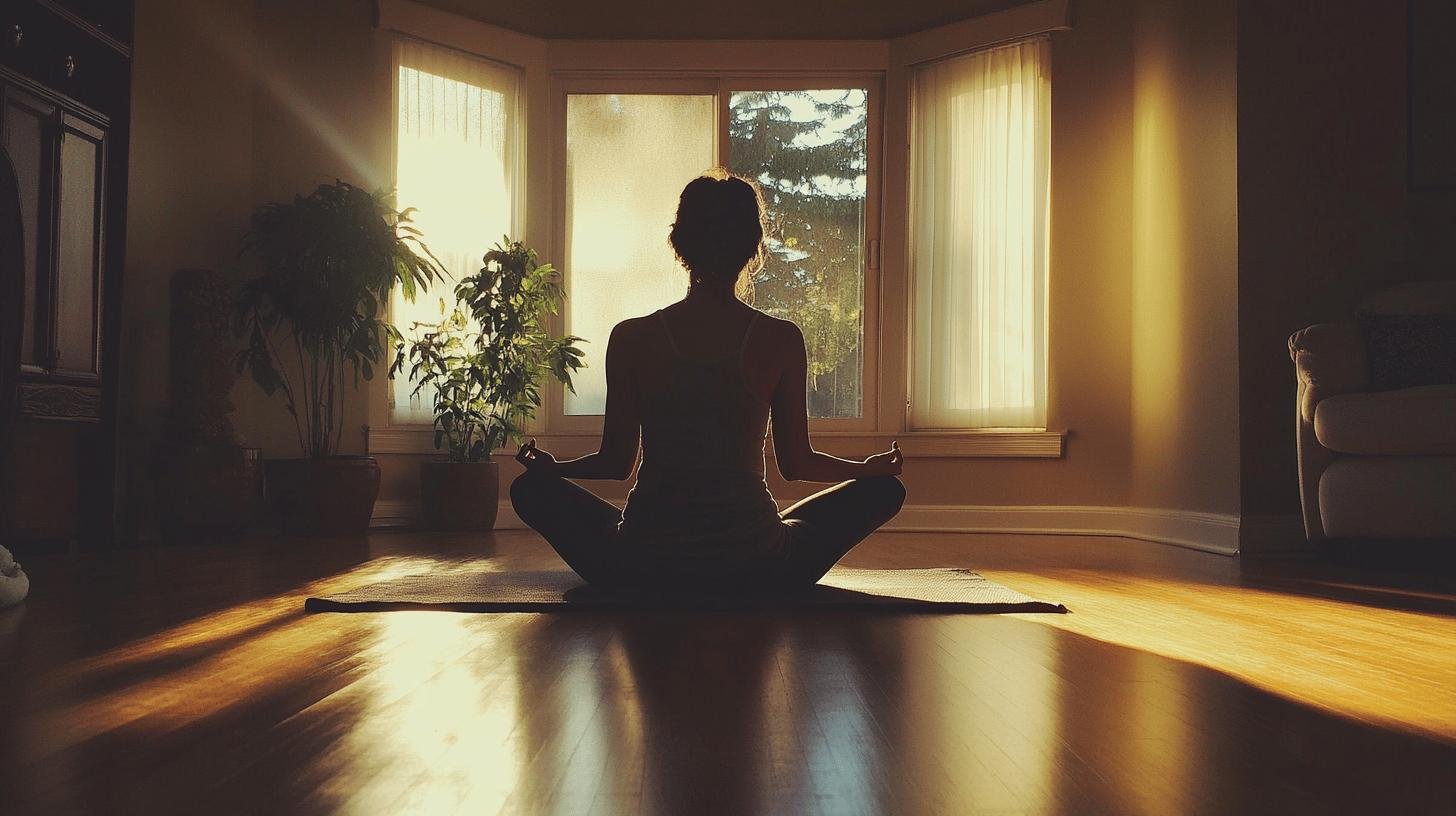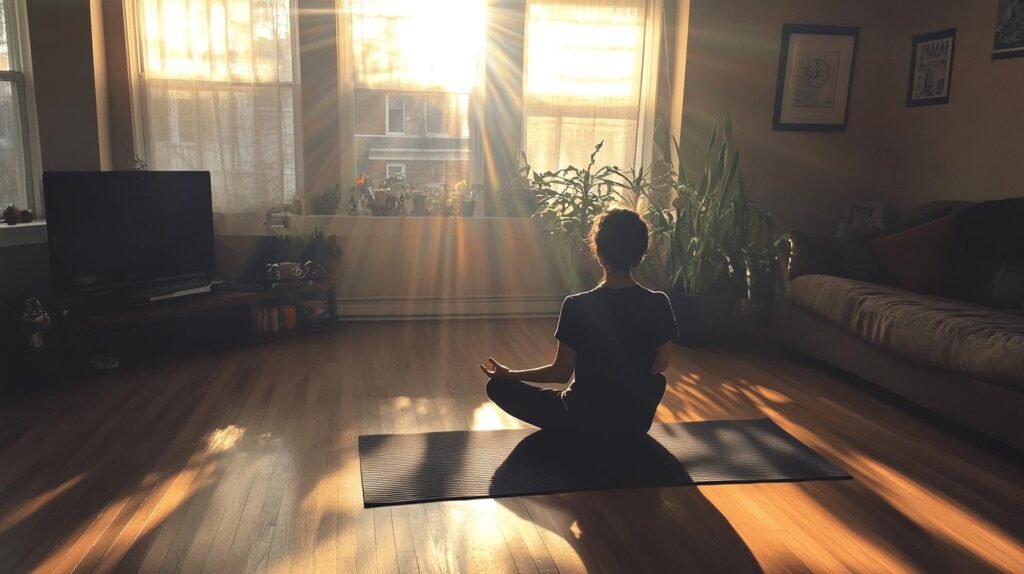TL;DR:
- Stress negatively impacts sleep quality, causing anxiety, restlessness, and frequent awakenings.
- Poor sleep increases stress, leading to irritability and cognitive difficulties.
- Signs of stress affecting sleep: anxiety, restlessness, and disrupted deep sleep.
- Quality sleep reduces cortisol levels, boosts immunity, enhances mood, and improves cognition.
- Healthy sleep habits include a consistent sleep schedule, calming scents, warm showers, and deep breathing.
- Techniques for better sleep include Cognitive Behavioral Therapy for insomnia, mindfulness, meditation, yoga, and controlled breathing.
- Avoid stimulants like caffeine and alcohol; opt for herbal teas and create a calming sleep environment.
Ever feel like sleep is slipping through your fingers while stress plays puppeteer with your life? Trust me, you’re not alone. Stress and sleep are like two frenemies locked in a tug-of-war. Sleep and Stress Management are key to breaking this cycle and finding balance. When stress increases, your sleep can get shaky, making stress crankier. Crazy cycle, right? But here’s the good news: understanding how these two are connected can help you chill that stress monster and reclaim peaceful nights. Stick around, and I’ll share how to boost your well-being with simple sleep and stress management tips!
Understanding the Sleep and Stress Relationship
Ever wonder if stress messes with your sleep? Let’s break it down. Stress can seriously affect your sleep quality. When stressed, your body goes into overdrive, leading to anxiety and restlessness. It feels like your brain won’t switch off! This anxiety disrupts your sleep, making it hard to reach deep, restful stages. You may wake up often, and your overall sleep efficiency suffers. It’s like trying to fill a leaky bucket—no matter how much you sleep, it never feels enough.
But that’s not all! Not enough quality sleep can boost stress levels. Notice how everything seems more complicated when you’re sleep-deprived? Lack of sleep can worsen stress, affecting your daily life and health. You’re more likely to feel irritable, struggle to concentrate, and make mistakes at work or school. Chronic sleep loss can weaken your immune system, making you more ill-prone. It’s a vicious cycle; breaking it is vital to improving well-being.
Look out for these signs that stress may be affecting your sleep:
- Increased anxiety and restlessness
- Frequent awakenings
- Difficulty achieving deep sleep
Recognizing these signs is the first step in getting back the restful sleep you deserve.
Importance of Sleep for Stress Reduction

Ever wonder why good sleep makes you feel unstoppable? Sleep is nature’s stress buster! Quality sleep reduces stress by decreasing cortisol, your body’s alarm hormone. So, getting enough rest turns down the volume of stress. But how does this work? Sleep helps your brain process emotions and memories, calming your nerves. It’s like giving your brain a mini-vacation every night. When you wake, you feel calm and ready for whatever comes your way.
Now, the details. Sleep boosts your immune system, keeping stress-related illness at bay. When well-rested, your body resists illness better. Think of sleep as your body’s maintenance crew, working overnight to keep you running smoothly. Plus, good sleep balances cortisol levels. High cortisol can cause weight gain, high blood pressure, and heart issues. So, resting well is like hitting the reset for your body.
But sleep isn’t just for your body—it’s also a mental health booster. Lack of sleep can make you anxious or moody because sleep is crucial for mental health. A solid night’s rest eases anxiety, elevates your mood, and even boosts problem-solving. It’s like upgrading your brain’s software overnight. With quality sleep, you’re not just surviving—you’re thriving!
| Benefit | Description |
|——————-|———————————————————————-|
| Cortisol Reduction| Lowers stress hormones, reducing anxiety and stress levels |
| Immune Boost | Enhances immune function, preventing illness-related stress |
| Mood Improvement | Elevates mood, reducing feelings of anxiety and depression |
| Cognitive Boost | Enhances mental clarity and decision-making, aiding in stress management |
Healthy Sleep Habits for Stress Relief
Ever wonder why a regular sleep routine makes such a difference? It’s like setting your internal clock. Going to bed at the same time nightly tells your body it’s time to wind down. This consistency reduces stress, sharpening your concentration, mood, and decision-making. It’s like giving your brain a map so it knows where to go and when.
Rituals matter. Bedtime isn’t just for kids! Use calming scents or enjoy a warm shower to make falling asleep easier. Lavender is excellent for calming vibes. A warm shower is not just for getting clean—it’s a signal for relaxation. Add deep breathing, and you’ve got a sleep-inducing routine. It’s like creating a personal spa at home.
These habits aren’t just physically soothing but also mentally powerful. Unwinding before bed helps your brain release daily stress, improving mood and easing anxiety. These habits remind you to let go of daily chaos. As a result, your mind feels clearer and more at ease, ready for tomorrow with a fresh outlook.
- Establish a consistent sleep schedule.
- Use calming scents like lavender.
- Take a warm shower before bed.
- Practice deep breathing exercises.
- Create a soothing bedtime environment.
Practical Stress Management Techniques for Better Sleep

Have you heard of Cognitive Behavioral Therapy for insomnia (CBTi)? It’s a game-changer for stress and sleep. By altering negative thoughts and behaviors, CBTi improves sleep quality. When stressed, minds race, making sleep tough. CBTi calms this storm, leading to healthier sleep habits and reducing anxiety. Think of it as a mental tune-up, helping your brain snooze stress away.
Mindfulness and meditation are fantastic for winding down. They train your brain to focus on the present, pushing past or future stress aside. Focusing on breath or a peaceful scene resets your mind. It’s like a mini-vacation. Meditation lowers heart rate and blood pressure, aiding sleep. Have you tried guided meditation at bedtime? It’s a lullaby for your mind.
Role of Physical Relaxation Techniques
Yoga and controlled breathing aren’t just for flexibility. These techniques relax both body and mind. Yoga stretches release muscle tension, while controlled breathing lowers heart rate. Practising these lowers stress and improves sleep quality. Consider it a physical reset, calming your body and signalling rest time.
Creating a personalized stress management plan tops it all off. Combine CBTi, mindfulness, meditation, and physical relaxation techniques to craft your ideal routine. Start by identifying stressors and relaxation techniques that resonate. Tailor your plan to your lifestyle. Soon, sleepless nights will be a memory. Sweet dreams await!
Nutrition and Lifestyle Changes for Improved Sleep and Stress Management
Do you feel like caffeine and alcohol mess with your sleep? You’re not alone! Reducing both boosts your sleep. Caffeine is a sneaky stimulant, keeping you wired well past bedtime. It’s like an unwanted cheerleader at night. Experts suggest cutting caffeine by late afternoon. And alcohol? Though it starts drowsiness, it disrupts sleep later. It’s like a party crasher leaving you groggy. Swap that nightcap for herbal tea to reach dreamland.
Now, lifestyle changes to improve sleep. Create a calming environment. Imagine your bedroom as a cosy oasis—dim lights, comfy pillows, and minimal noise. It’s the perfect stage for sleep. Keep your room cool and dark to cue relaxation. Ditch screens before bed; blue light tricks your brain into thinking it’s daylight. Instead, read or practice deep breathing. These tweaks enhance your snooze quality.
- Foods rich in magnesium, like leafy greens
- Omega-3 fatty acids found in fish
- Herbal teas like chamomile
- Whole grains for steady energy levels
Final Words
Managing sleep and stress can be a balancing act. We learned that stress messes with sleep, leading to restless nights and anxious days. But getting quality shut-eye can curb stress, improve mental health, and make everyday life smoother.
With healthy bedtime habits and stress-busting techniques like meditation and CBTi, feeling more relaxed is within reach. Plus, munching on magnesium-rich foods and creating a calming space can set you up for dreamy nights.
Embracing these changes could make all the difference. Sweet dreams and low stress are the ultimate win-win!
FAQ
Is sleep good for stress and anxiety?
Sleep significantly helps reduce stress and anxiety by allowing the body to lower stress hormones. Quality sleep improves mood and overall mental well-being, effectively managing stress and anxiety.
What are the symptoms of lack of sleep and stress?
Symptoms of lack of sleep and stress include increased anxiety, restlessness, frequent awakenings, and difficulty achieving deep sleep. These signs indicate that stress is interfering with your sleep quality.
How can I sleep when stressed and anxious?
To sleep when stressed and anxious, create a soothing bedtime routine. Consider using calming scents and practising relaxation techniques like deep breathing to unwind and improve sleep quality.
How does sleep affect stress?
Sleep affects stress by regulating cortisol levels, a primary stress hormone. Sufficient sleep reduces cortisol, enhancing stress management and improving mood, immune function, and overall mental health.
What is the relationship between stress and sleep quality?
The relationship between stress and sleep quality is closely linked. Stress disrupts sleep patterns, leading to poorer sleep quality, while lack of sleep increases stress levels, creating a challenging cycle to break.
How do you stop stress sleeping?
Maintain a regular sleep schedule to prevent stress from affecting your sleep. Engage in relaxation techniques before bed and create a calming environment to promote restful and uninterrupted sleep.
How does sleep help manage stress?
Sleep helps manage stress by improving emotional regulation and reducing stress hormone levels. It enhances problem-solving and decision-making skills, boosting resilience against everyday stressors.
What are the 4 A’s of stress management?
The four A’s of stress management are Avoid, Alter, Adapt, and Accept. These strategies help people manage stressful situations and improve their coping mechanisms effectively.
What is the correlation between sleep and stress?
The correlation between sleep and stress shows that stress negatively impacts sleep quality, while inadequate sleep heightens stress, creating a loop where each affects the other.
How can I improve sleep while stressed?
To improve sleep while stressed, establish a consistent bedtime routine and environment. Practice relaxation techniques such as meditation or deep breathing, and limit caffeine and screen time before bed.

